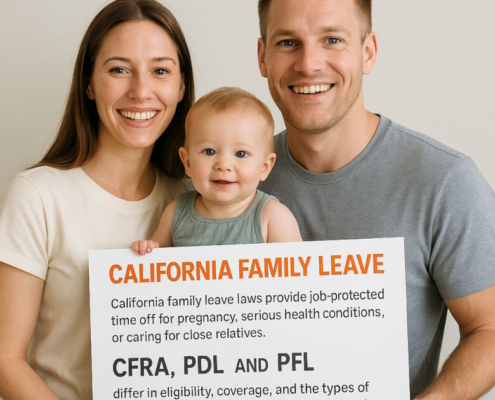California Random Drug Testing Law
Random drug testing is not permitted in California, and employers must give their employees notice before a drug test is given.
By Brad Nakase, Attorney
Email | Call (888) 600-8654
What protections do employees have against drug testing in California?
The state of California has specific legal protections for employees when it comes to random drug testing. The state has laws in place to ensure that drug testing is conducted fairly, reasonably, and with respect for employee privacy rights.
Employers in California can require employees to undergo drug testing based on reasonable suspicion of drug use. This means that there should be specific, objective facts and circumstances that lead the employer to believe an employee is under the influence of drugs while at work or that their job performance is impaired due to drug use.
California generally allows pre-employment drug testing, but it must be conducted uniformly for all applicants for the same job position. The testing should not single out specific individuals or groups for testing based on protected characteristics such as race, ethnicity, or disability.
Random drug test results must be kept confidential and stored securely. Only those with a legitimate need to know the results should have access to the information. Further, California law prohibits employers from disclosing drug test results to third parties without the employee’s written consent, except as required by law.
The state has legalized medical marijuana for qualified patients. As a result, employers are generally prohibited from discriminating against employees or applicants who are qualified medical marijuana users, as long as they use marijuana outside of work and without impairment during work hours.
Random drug testing of employees is generally not allowed in California, except for certain safety-sensitive positions, such as transportation or jobs that involve public safety.
Employers are permitted to conduct drug testing after a workplace accident that resulted in injury or property damage, but the testing should be reasonable and limited to employees whose actions could have contributed to the incident.
If employees are covered by a union and their employment random drug testing policies are governed by a collective bargaining agreement, the testing procedures and rules may be subject to negotiation between the employer and the union.
It is important for both employers and employees in California to understand the state’s laws and regulations surrounding employment drug testing to ensure compliance with the law and protect the rights of all parties involved. If an employee believes their rights have been violated in relation to drug testing, they may wish to seek legal advice to understand their employee rights and protections under California law.
Is pre-employment drug testing legal in California?
California employers are generally allowed to conduct pre-employment drug testing. As mentioned earlier, pre-employment drug testing is permitted in California, but it must be conducted uniformly for all applicants applying for the same job position. In addition, employers must ensure that drug testing policies do not single out specific individuals or groups based on protected characteristics such as race, ethnicity, or disability.
Regarding the issue of medical marijuana and employers’ rights to prevent marijuana use, the case of Ross v. RagingWire Telecommunications, Inc. is particularly relevant. In this case, the California Supreme Court ruled on the matter of an employee who was terminated for testing positive for marijuana despite being a qualified medical marijuana user.
In Ross v. RagingWire Telecommunications, Inc. (2008), the plaintiff, Gary Ross, was a former Air Force veteran who had a doctor’s recommendation to use medical marijuana to treat chronic back pain resulting from injuries sustained during his military service. Ross disclosed his medical marijuana use during the hiring process, but after a required drug test, he tested positive for marijuana and was subsequently terminated by RagingWire.
The key issue in the case was whether an employer could lawfully terminate an employee for using medical marijuana, even though it was legally prescribed under California’s Compassionate Use Act (Proposition 215) for medical purposes.
The California Supreme Court ruled in favor of the employer, holding that employers have the right to enforce drug-free workplace policies and can terminate employees who test positive for marijuana, even if the use is for medical reasons and in compliance with state law. The court reasoned that Proposition 215 did not require employers to accommodate or tolerate the use of marijuana in the workplace.
The court’s decision clarified that the Compassionate Use Act did not grant employees a right to use medical marijuana in violation of an employer’s drug-free workplace policy. Therefore, California employers can still enforce drug testing policies that include testing for marijuana and take adverse actions against employees who test positive for marijuana use, even if they are medical marijuana patients.
However, it is important to note that the landscape of marijuana laws is continuously evolving, and there may be subsequent legal developments that could impact the issue of medical marijuana and employment rights. Employers and employees should stay informed about any changes in state and federal laws that may affect drug testing policies and the rights of medical marijuana users in the workplace.
Is random drug testing legal in California?
In California, random drug testing in workplaces is generally not allowed except for certain safety-sensitive positions or in industries where safety regulations require such testing. The California Supreme Court ruled in the case of Loder v. City of Glendale (1997) that random drug testing of employees who are not in safety-sensitive positions or whose job duties do not involve public safety is unconstitutional under the California Constitution’s right to privacy.
Exceptions to the general prohibition of random drug testing in California include:
- Safety-Sensitive Positions: Employers in safety-sensitive industries, such as transportation, aviation, or positions that directly impact public safety, may be permitted to conduct random drug testing to ensure the safety of employees, customers, and the general public.
- Federal Regulations: Some federal regulations mandate random drug testing in certain industries, and these regulations may apply in California as well. For example, the Department of Transportation (DOT) requires random drug testing for employees in safety-sensitive transportation roles.
- Collective Bargaining Agreements: In some cases, unionized employees may be subject to random drug testing if the practice is negotiated and agreed upon in a collective bargaining agreement.
The right to privacy is fundamental in California, and the state constitution explicitly protects individuals from unreasonable invasions of their privacy. The right to privacy is especially relevant in the context of drug testing, where individuals may feel their personal privacy is violated when subjected to random or intrusive testing.
Privacy is essential for preserving an individual’s dignity and autonomy. Drug testing, especially when done randomly, can be seen as invasive and humiliating, potentially undermining an employee’s sense of self-respect and individuality.
Drug test results may also reveal private medical information and may expose an individual’s health conditions or medication use, which should generally be kept confidential.
Further, random drug testing may lead to stigmatization and unfairly target certain employees or groups, creating an atmosphere of mistrust and discrimination in the workplace.
While workplace safety is crucial, balancing safety concerns with individual privacy rights is essential to ensure a fair and respectful work environment.
It is important for employers to be aware of California’s strict privacy laws and to ensure that any random drug testing policies they implement comply with state regulations. Employers should carefully consider the necessity of drug testing and limit it to situations where safety and job-related reasons justify such testing. Employees should be informed about their rights and privacy protections when it comes to drug testing in the workplace.
When is employee drug testing illegal in California?
Employee drug testing in California can be considered illegal under certain circumstances, especially when it violates anti-discrimination laws and the rights of employees with disabilities. The following are some situations where drug testing may be unlawful in the state:
- Discrimination Based on Protected Characteristics: California’s anti-discrimination laws prohibit employers from conducting random drug testing that targets certain individuals or groups based on protected characteristics such as race, color, national origin, religion, sex, gender identity, sexual orientation, disability, age (over 40), and other protected categories. Drug testing policies that disproportionately affect certain protected groups may be considered discriminatory.
- Medical Conditions and Disabilities: Under the Americans with Disabilities Act (ADA) and the California Fair Employment and Housing Act (FEHA), employers are required to provide reasonable accommodations for employees with disabilities, including those who use prescription medications. If an employee tests positive for drugs due to the use of prescribed medications to treat a disability, the employer may be required to accommodate the employee’s medical condition rather than taking adverse action based on the drug test result.
- Off-Duty Drug Use: California Labor Code Section 96(k) prohibits employers from taking adverse actions against employees based on lawful off-duty conduct. If an employee uses drugs or engages in lawful activities outside of work hours, it generally cannot be a basis for termination or other adverse employment actions.
- Invasion of Privacy: California recognizes a right to privacy, and random drug testing practices that are overly intrusive or not conducted in a manner that respects employee privacy may be considered illegal.
- Random Drug Testing: As mentioned earlier, random drug testing of employees in non-safety-sensitive positions is generally not permitted in California under the right to privacy. Exceptions may apply for safety-sensitive positions or when required by federal regulations.
Employers in California must be mindful of these legal restrictions and ensure that their drug testing policies and practices comply with state and federal laws, including the ADA and anti-discrimination laws. Drug testing should be carried out with fairness, respect for privacy, and consideration for any accommodations required for employees with disabilities. If an employer’s drug testing policies violate these laws, they may be subject to legal action and potential penalties. Employees who believe their rights have been violated may seek guidance from legal counsel or file complaints with relevant labor enforcement agencies.
What qualifies as a valid claim against drug testing in California?
A legitimate legal claim against random drug testing in California could arise if an employee’s rights are violated under applicable state and federal laws. Some potential legal claims against drug testing in the state include:
- Violation of the Right to Privacy: If an employer’s random drug testing policy or practices are overly intrusive, conducted without a legitimate reason, or fail to respect the employee’s right to privacy, the employee may have a claim based on the violation of their privacy rights under the California Constitution.
- Disability Discrimination: If an employer takes adverse action against an employee based on a positive random drug test result that was caused by the use of prescribed medication to treat a disability, it may be considered disability discrimination under the Americans with Disabilities Act (ADA) and the California Fair Employment and Housing Act (FEHA). The employer is required to provide reasonable accommodations for employees with disabilities, including those who use prescription medications.
- Failure to Accommodate: If an employee with a disability requests a reasonable accommodation related to drug testing, such as an alternative testing method or an exemption from testing due to a medical condition, and the employer refuses to provide the accommodation without a legitimate reason, the employee may have a claim for failure to accommodate under the ADA and FEHA.
- Discrimination Based on Protected Characteristics: If an employer’s drug testing policy disproportionately affects certain protected groups, leading to discrimination based on race, sex, age, religion, or other protected characteristics, the affected employees may have a claim for discrimination under state and federal anti-discrimination laws.
- Violation of Off-Duty Conduct Protections: If an employer takes adverse action against an employee based on lawful off-duty drug use or other lawful activities outside of work hours, it may violate California Labor Code Section 96(k), which protects employees from discipline or termination for lawful off-duty conduct.
- Failure to Comply with State or Federal Drug Testing Regulations: If an employer fails to follow California’s specific requirements regarding drug testing or violates federal regulations applicable to certain industries (ex: Department of Transportation regulations), employees may have legal claims based on non-compliance.
It is essential to consult with an employment attorney to understand the specifics of your situation and whether you have a legitimate legal claim against random drug testing in California. The attorney can evaluate the circumstances, applicable laws, and potential remedies available to protect your rights and interests. Keep in mind that the legal landscape surrounding employment drug testing can be complex, and seeking professional legal advice is crucial for a comprehensive understanding of your rights and options.
Have a quick question? We answered nearly 2000 FAQs.
See all blogs: Business | Corporate | Employment Law
Most recent blogs:
Contact our attorney.
































